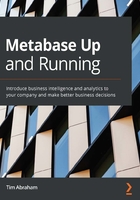
Why open source?
One of the unique things about Metabase that sets it apart from other analytics software is that it is open source. That means the source code for Metabase is freely available to be downloaded, redistributed, and modified. All the code for Metabase is hosted on the project's GitHub repository at https://github.com/metabase/metabase. So why is open source a big deal and how might it benefit you, the user?
It's free
Analytics software can be pricey. The goal of Metabase is to offer the same (or better) quality for free, so you can get the most value from your data without paying a third party. Metabase's open source software is and always will be 100% free to use. You may be wondering: how does Metabase make money? Recently, they've come out with an Enterprise version and a cloud hosting solution, both of which they charge for. The Enterprise version has some powerful features, some of which might make sense for certain organizations. In this book, we'll focus on the open source product.
You are in control of your data
Another downside to paying for an analytics software solution, aside from the cost, is an intrinsic lack of control. In most cases, this means that your data either sits on or is connected to a third party's servers. For organizations with privacy concerns, this can be a deal breaker. In my career, I've seen many companies balk at purchasing analytics software when they learn that their data will be ingested by a third party. In today's world, data can be too valuable or sensitive to take that risk.
However, because Metabase is open source, you get full control. This means that instead of paying for a license to access software on a third party's server that connects to or ingests your data, you install Metabase on your own server. You connect your data to your own server. Everything stays within your organization's network environment.
It is also more robust than most enterprise software because the code will always be available to run. Even if Metabase should one day go out of business, you will still have access to the source code and can continue to run it. This would not be necessarily true for an enterprise analytics software product.
What's the catch?
If Metabase is free, safer, and the more robust option, then what is the catch? Third-party software providers will often offer lots of support (at a price, of course) to make setting up and using their software as easy as possible. With Metabase, you are more or less on your own. While Metabase has an Enterprise version you can pay for, and recently released a cloud hosting service, this book will focus on teaching you how to master the free offering. The Metabase team has plenty of documentation meant to help, and any gap there will be filled in with this book so that installing, using, and collaborating with Metabase is super simple. By following along with all the examples and tutorials in the book, it'll be as if you have your own dedicated support team!
Now that we have a good background on Metabase, let's go ahead and learn how to install it.